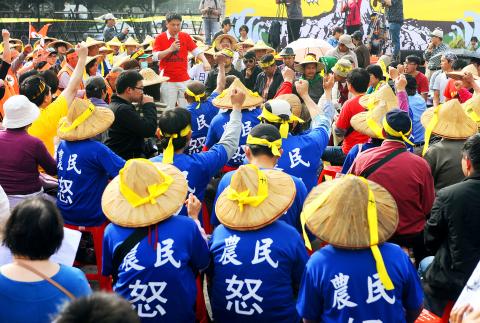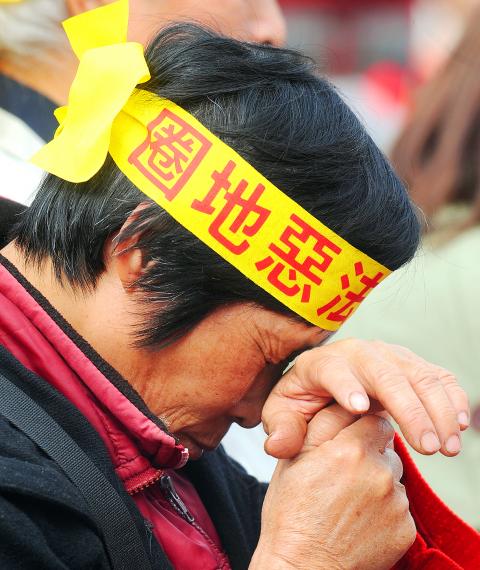Hundreds of people, including farmers and farming activists from Taiwan, Thailand, Indonesia, South Korea, Japan and Malaysia, yesterday rallied against the globalization of agriculture on Ketagalan Boulevard in front of the Presidential Office, protesting against the government’s plans to lift more bans on agricultral imports.
“We gather here today to express our anger, we want to tell the government that we’re fed up with their compromises on our food sovereignty, it’s a serious problem that our food self-sufficiency has dropped to 33 percent now,” Taiwan Rural Front (TRF) spokeswoman Tsai Pei-hui (蔡培慧) told the crowd at the rally. “You’ve put our dining tables and refrigerators in other people’s homes, we want to keep them in our own places.”
In addition to a series of heated protests against land expropriations that have been going on for years, farmers and farming activists are worried that the government may soon lift the bans on imports of 830 categories of farm products from China, as well as pork products from the US, despite President Ma Ying-jeou’s (馬英九) repeated promises that he would not do so.

Photo: Liao Chen-huei, Taipei Times
“During the presidential campaign, Ma promised numerous times that he would not lift the bans on imports of 830 categories of farm products from China, but now, Council of Agriculture Minister Chen Bao-ji (陳保基) is saying that the bans ‘may’ be lifted,” said National Cheng Chi University land economics professor Hsu Shih-jung (徐世榮), a long-time advocate of farmers’ rights. “When the government decided to lift the ban on imports of certain US beef products amid strong opposition from the public, Ma also firmly promised that the imports of US pork products would remain banned — yet the US government is now pressuring the Ma administration to lift the ban.”
Hsu said farmers across the country now “have little confidence in this incapable government” and therefore gathered to voice their opposition to free trade in the agricultural sector and to call on the government to insist on agricultural sovereignty.
Henry Saragih, the general coordinator of the Jakarta, Indonesia, office of international small farmers’ organization La Via Campesina, said that the problems that Taiwanese farmers encounter are the same for farmers across the world.

Photo: Liao Chen-huei, Taipei Times
La Via Campesina is an international coalition of peasants’ movements with 148 member groups in 69 countries around the world.
“Land grabbing, loss of food sovereignty and an increasing number of people threatened by famine — now reaching more than 1 billion — are problems created by the WTO, globalization and neo-liberalism,” Saragih said.
He said that Thailand, for instance, which originally had a diverse agricultural sector, now specializes in producing rice for export, and has to import other produce.
South Korea has become an exporter of electronic products, “and since most of its farmland has been taken by the industrial sector, some South Korean agricultural companies now grab land in Africa — especially Madagascar — to grow produce to be imported back to South Korea, leaving Madagascan farmers landless,” Saragih said.
Wirat Phromson, a member of the Northern Peasants’ Federation Thailand, urged farmers in Taiwan to continue their struggle.
Citing the farming rights movement in Thailand, Phromson said that despite the seeming flexibility of the Thai government and its promise to revise laws, “the [Thai] government eventually amended laws concerning the agricultural sector, but not for the interests of the peasants. Rather, it was for the interests of big corporations.”
“We want to tell our brothers and sisters in Taiwan and in Via Campesina: Do not believe those empty promises of the government,” he said. “We can’t let people from outside take valuable resources from us and impose on us the sufferings of hunger.”
Following performances by musicians in the evening, the rally ended with protesters throwing bundles of straw toward the Presidential Office.

SECURITY: As China is ‘reshaping’ Hong Kong’s population, Taiwan must raise the eligibility threshold for applications from Hong Kongers, Chiu Chui-cheng said When Hong Kong and Macau citizens apply for residency in Taiwan, it would be under a new category that includes a “national security observation period,” Mainland Affairs Council (MAC) Minister Chiu Chui-cheng (邱垂正) said yesterday. President William Lai (賴清德) on March 13 announced 17 strategies to counter China’s aggression toward Taiwan, including incorporating national security considerations into the review process for residency applications from Hong Kong and Macau citizens. The situation in Hong Kong is constantly changing, Chiu said to media yesterday on the sidelines of the Taipei Technology Run hosted by the Taipei Neihu Technology Park Development Association. With

CARROT AND STICK: While unrelenting in its military threats, China attracted nearly 40,000 Taiwanese to over 400 business events last year Nearly 40,000 Taiwanese last year joined industry events in China, such as conferences and trade fairs, supported by the Chinese government, a study showed yesterday, as Beijing ramps up a charm offensive toward Taipei alongside military pressure. China has long taken a carrot-and-stick approach to Taiwan, threatening it with the prospect of military action while reaching out to those it believes are amenable to Beijing’s point of view. Taiwanese security officials are wary of what they see as Beijing’s influence campaigns to sway public opinion after Taipei and Beijing gradually resumed travel links halted by the COVID-19 pandemic, but the scale of

A US Marine Corps regiment equipped with Naval Strike Missiles (NSM) is set to participate in the upcoming Balikatan 25 exercise in the Luzon Strait, marking the system’s first-ever deployment in the Philippines. US and Philippine officials have separately confirmed that the Navy Marine Expeditionary Ship Interdiction System (NMESIS) — the mobile launch platform for the Naval Strike Missile — would take part in the joint exercise. The missiles are being deployed to “a strategic first island chain chokepoint” in the waters between Taiwan proper and the Philippines, US-based Naval News reported. “The Luzon Strait and Bashi Channel represent a critical access

Pope Francis is be laid to rest on Saturday after lying in state for three days in St Peter’s Basilica, where the faithful are expected to flock to pay their respects to history’s first Latin American pontiff. The cardinals met yesterday in the Vatican’s synod hall to chart the next steps before a conclave begins to choose Francis’ successor, as condolences poured in from around the world. According to current norms, the conclave must begin between May 5 and 10. The cardinals set the funeral for Saturday at 10am in St Peter’s Square, to be celebrated by the dean of the College